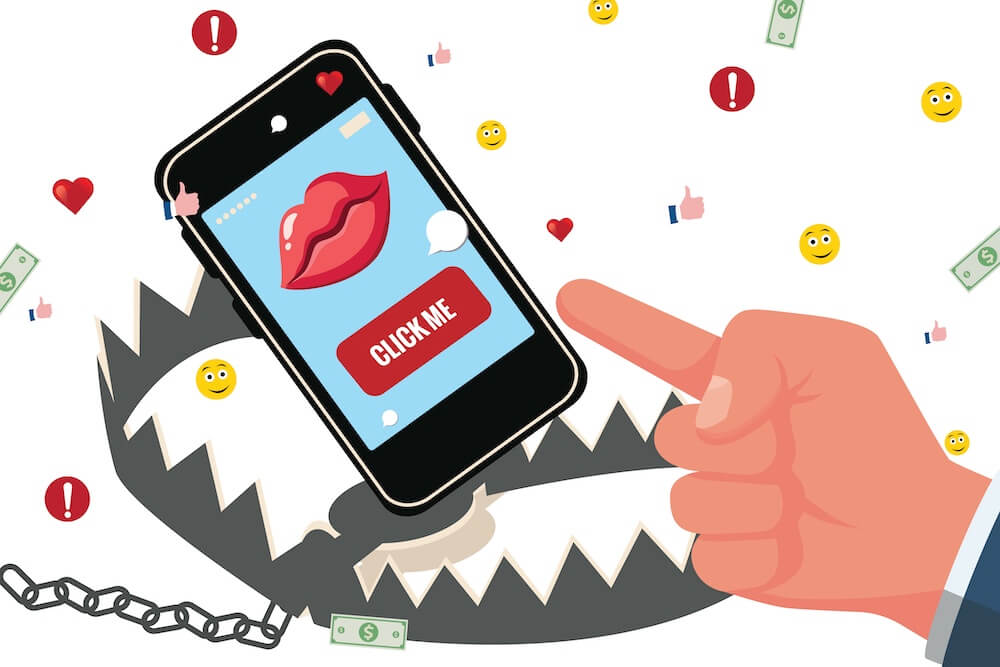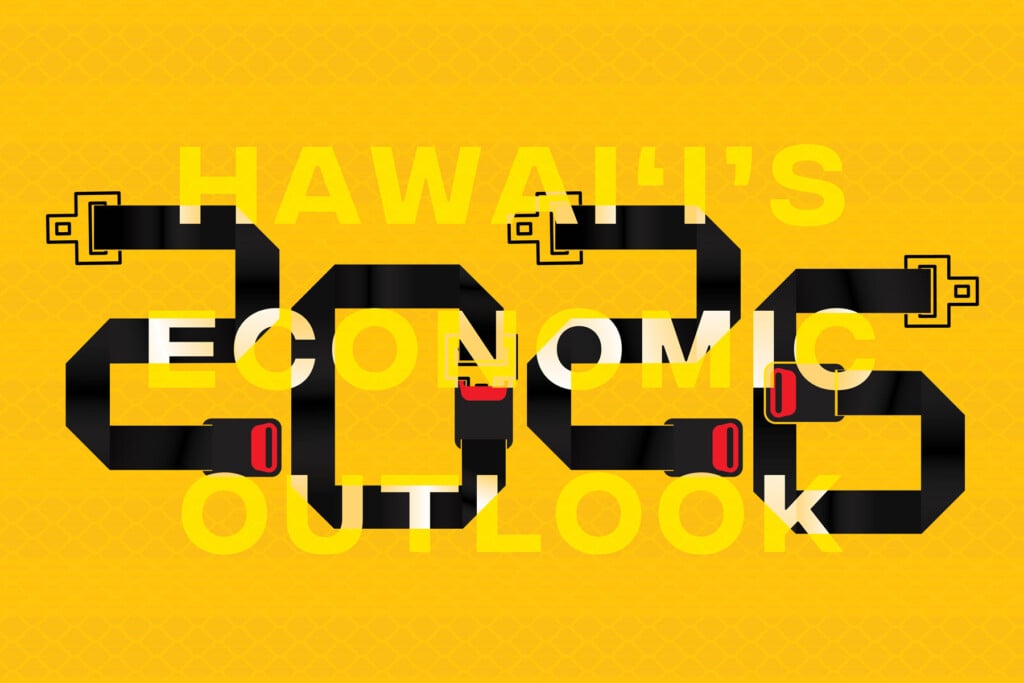Think You Can Spot a Scam? So Did Thousands of Hawai‘i Residents Who Lost Money Last Year.
Local people lost $61.6 million in 2024 to fraud, from romance and cryptocurrency scams to fake concert tickets and gig work. Our writer was one of them.

You may have been too preoccupied with the pandemic to notice, but right around 2020, young people started falling victim to scams just as often as older people. And it’s a trend that continues today.
The reasons are plentiful: Young people are likely to be on their phones, on social media and online more often than other generations – and that’s where fraud often happens. And they’re more comfortable and confident using technology, which can make them less cautious about cyber scams. Or maybe they’re enticed by online trading, cryptocurrency investments and gig work, areas where fraudsters thrive.
And older adults have been warned about fraud for decades, so their warning radar may be well developed – whereas young people may be encountering these schemes for the first time.
One fact remains: Older folks generally have more money than younger ones, so they lose more to scammers, on average.
Fraudsters create urgency or fear that puts pressure on people, persuading many to react irrationally and uncritically in real time. They also use emotional manipulation – maybe leveraging personal relationships or fake familiarity – to lower a victim’s defenses.
“Scammers are going to play on your emotions and they’re going to push urgency,” says Cameron Nakashima, media engagement and digital campaigns manager for the Better Business Bureau Great West + Pacific.
“So if you can take a minute to step away from the situation, whether it’s over the phone, over a message, anything like that, give yourself time to process and just think about it outside of your situation.”
Keali‘i Lopez, AARP Hawaii’s state director, says people have to think beyond the panic and faux emergencies that scammers create. Once you step back and take time to really think about what’s happening, you might recognize you’re being conned. Scammers try not to give you that time.
BBB tracks scams reported nationally by victims as well as those who spot scams before any damage is done. It collects information on government, personal and business imposters and scams on its scam tracker. The top three national scams target investments, employment and romance.
More than 80% of people who reported cryptocurrency investment scams to BBB lost money to it. Nakashima says it is one of the most susceptible scams, with the second highest monetary loss. In Hawai‘i, seven people reported to the BBB that they had lost money to cryptocurrency fraud. Together, those seven lost $289,575. Employment scams – often where people are offered enticing jobs but told to pay money up front to lock down the jobs – are the most reported, but the amounts lost are lower. Locally, 29 people reported the scam in 2024 with a median loss of $1,500.
“I love you.” Not!
When someone contacts you on social media or a dating app, beware: It might be a romance scam, also known as a friendship scam.
“They’re going to be messaging you for weeks, months, sometimes even years, to gain as much trust as possible and then convince you, usually people who are later in life who’ve amassed a large 401(k), a retirement fund … to liquidate literally everything that they’ve spent their life saving” and send it to them, Nakashima says.
The romance scam, he says, is the costliest in terms of the median loss, at $6,099.
“Where they’re going to try to strike, what they’re going to try to get from you, the avenues that they use, those will look different from generation to generation,” he says.
The Federal Trade Commission’s Consumer Sentinel Network 2024 Data Book found that in the U.S., people in their 20s lost money to fraud more often than people in their 70s. However, people in their 70s lost more money, a median of $1,000 compared with $417 for people in their 20s. For U.S. scam victims over 80 the median loss was $1,650.
Hawai‘i fraud reports show much higher losses for kūpuna over 80 – a median of $4,250.
“It doesn’t matter if you’re a 19-year-old trying to snag a good deal online or if you’re 65 and you think you’ve made a new friend online, it’s going to look different, but scammers are everywhere,” Nakashima says. “So … it’s important to be vigilant. We say, ‘trust but verify.’ ”
There are a few ways to verify online whether an organization is legitimate. Search the group’s website and make sure it matches a legitimate organization. At BBB.org, some businesses are flagged if there is a pattern of complaints.
“Unfortunately … not many organizations have a great solution after you’ve lost money or lost your personal data,” including the BBB, Nakashima says. “There are steps to recover, and if you contact Better Business Bureau, we’ll do our best to get you in touch with the right people and get you on the path to correction. But if you can avoid getting into that situation in the first place, that’s really going to be the best thing for you.”
I knew all about online fraud, yet …
On Feb. 12 at 9 p.m., I got scammed on Instagram.
I wanted to attend a sold-out concert and was messaged that people were reselling tickets on Instagram. Even then I knew that people get scammed all the time – including over concert tickets – but in a moment of naivety, I sidestepped all the safeguards I had been taught.
I messaged the “seller” and eventually sent $90 for three tickets. I was then told to send more money for the ticket transfer. And all the while, I was telling myself – and my roommate – that I felt like I was being scammed. But I continued the exchange. As the “seller” and I continued our back and forth – we’d been dealing for nearly three hours at this point – my suspicions eventually peaked, and I demanded the tickets I’d already paid for.
Only at 11:30 p.m. did I realize I was never going to get those tickets. I’d been scammed.
If this fraud sounds obvious, it was. I should never have trusted the person I was dealing with – someone I didn’t even know. I should never have sent money. But I was excited to see that concert. When the exchange ended, I canceled what I could and just stared at a wall, feeling stupid for sending $150 to a scammer. I felt so much shame.
AARP’s Lopez says victim shaming is common. The people losing money often feel like it’s their fault, even though the fault is truly only with the scammers.
Shame can lead people to avoid reporting the crime, or not talking about it, which can leave them vulnerable to more scams, she says.
“We also try now at AARP, rather than using the term victim, we will use the term ‘consumer.’ They still are a victim, but now we are trying to move away from that shame part.”
In the past decade, Lopez says investment crypto scams have been the most common and impactful. And she says those scams will remain a prevalent problem.
AARP supported Hawai‘i House Bill 1277, which was introduced in 2025 to protect consumers from cryptocurrency scams. It would have imposed a daily maximum of $1,000 on transactions through digital financial asset transaction kiosks, also known as cryptocurrency ATMs. The bill died at the state Legislature, but Lopez says AARP will continue to push for such caps to prevent fraud.
Scammers will “have kūpuna take money out of their bank accounts and go to a kiosk and transfer thousands or tens of thousands of dollars in one fell swoop. And because it’s not regulated, once the money’s gone, it’s gone.”
Been scammed? Here’s what to do next.
If you are a victim of fraud, stop all communications with the fraudster and contact your bank as soon as possible, says Brian Ishikawa, senior VP and director of corporate security at Bank of Hawai‘i, and chairman of the Hawaii Association of Financial Institution Security Officers.
Association members coordinate with each other and with local law enforcement agencies. They also collect fraud reports from clients and investigate them. Your bank may freeze your account, cancel credit and debit cards, dispute charges and take other actions.
If you have shared your Social Security information with a fraudster, contact the Social Security Administration at 800-269-0271 or report it at oig.ssa.gov/report.
You should also report it to the FTC at reportfraud.ftc.gov. The more reports the federal government receives, the more information it will have to combat fraud.






